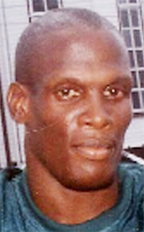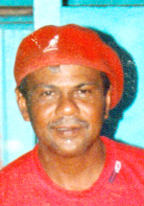-human rights activist
The recent killings at the George-town Prison, incited by double murder accused Solomon Blackman, could have been avoided, according to Guyana Human Rights Associa-tion co-president Mike McCormack, who says the Health and Home Affairs ministries as well as the courts could have used better judgement in the handling of the prisoner.

McCormack has also described the current state of the correctional facility as a cramped, physically unhealthy environment, which would send up the stress levels of prisoners and could eventually brew into a catastrophic situation.
On February 5, Blackman and another prisoner, Dyal Singh, died after a fight broke out in the capital offence dormitory of the prison. In a statement, the Home Affairs Ministry explained that due to persistent medical treatment, the mentally-ill Blackman showed some improvement. As a result, he was removed from the Social Division and allowed to live and mix with the general population. The ministry described the incident as “most unfortunate”, but stated that the security at the prison was stable.
Recently, when quizzed by reporters on the problems at the penitentiary, Director of Prisons Dale Erskine said, “The prison is an institution that has a lot of arms that works with it. We are doing what we are supposed to do within the prisons and other agencies would have to do what they are supposed to do, to ensure that the system is operating effectively and efficiently.”
McCormack, in an interview with Stabroek News last week, said that the prison is the worst place for a mentally ill person and according to an assessment done about three years ago there were 15 such persons at the Georgetown Prison. These persons were dwelling among the general population, instead of being isolated. He stressed that nationally, the services for mentally ill persons are limited and this is posing a serious challenge for the prison administration.
Blackman, he said ought not to have been at the prison, given his mental history. Further, he said the argument that the psychiatric facility at Berbice is unsafe for mentally ill prisoners, does not make sense. McCormack explained that any facility that houses mentally ill persons has to be secured anyway and, in the case of Blackman and the other mentally unstable inmates at the prisons, they could have been housed in a separate section of the Berbice facility, which would be the most logical thing to do. McCormack did, however, acknowledge that staffing would become an issue in such circumstances, since dealing with such prisoners would require trained personnel.
According to the law, it is the minister (of Home Affairs) who has the authority to move a

prisoner of unsound mind to a mental hospital, where he is to be kept and treated until a medical superintendant certifies that that prisoner no longer needs treatment at that institution. However, Blackman was never removed. Instead, he had been dwelling in the prison since 2004, when he was taken into custody after walking into the Brickdam Police Station and fatally shooting two ranks and injuring two others.
According to McCormack, one cannot entirely blame the Guyana Prison Service for the current state of the Georgetown Prisons, because it comes under the responsibility of the Ministry of Home Affairs, which has failed to address numerous issues, including staffing and overcrowding over the years.
Numerous efforts made by this newspaper to speak with Minister Clement Rohee about the state of the Georgetown Prisons were unsuccessful.
Serious health issues
Last September, there were 1,117 prisoners housed in the Georgetown Prison, three times the number intended to be held there, Mc Cormack noted, adding that the court has to take most of the blame for this situation. “Magistrates and judges should take responsibility and send these people where they ought to be. It is not the prison system’s fault that it is overcrowded, it is the courts,” he explained. He said that because of the situation, the various categories of prisoners are inadequately housed and for the Prison Service, the security and the housing of these prisoners are their biggest concern.
Mc Cormack also said that the conditions in the Georgetown Prison are deplorable and he opined that the Health Ministry needs to play a greater role to ensure that the prisoners are being housed under sanitary conditions. He stated that during last year there were two outbreaks of Chicken Pox, which should be a cause of concern for all.
From all indications, there is only one medex at the prison to attend to all the prisoners and McCormack called the state of affairs grossly inadequate, noting that it is something that needs urgent redress.
According to the Prison Act, “The Chief Medical Officer shall assign in respect to each prison, one government medical officer who shall have control generally of the health and medical welfare of the prisoners and the sanitation of the prison and such medical officer shall perform such other duties as may be directed by this Act or the Prison Rules.” This newspaper attempted to ascertain if such an officer was attached to the prison but was unsuccessful. When contacted, Minister of Health Dr Leslie Ramsammy said that the prisons have their own medical team. Erskine did confirm that there is a psychiatrist, Dr Bhiro Harry, who is attached to the Georgetown Prison and who would visit the facility bi-monthly. However, he could not say if it was Dr Harry who declared Blackman fit to return to the prison population.
Blackman had been an inmate in the social division, where he was receiving treatment. After he began showing signs of improvement, he was allowed to live with the general population of the prison.
Inadequate staffing
Erskine, while speaking to the media, also admitted that the prison system is under strain from inadequate staffing when compared with the number of inmates. This problem, he added, is being addressed at present. “With most prisons you always find a disparity between prison officers and prisoners, and the Guyana Prison Service is no difference, we are under the same stress and strain in terms of staff,” he stated.
Commenting on this situation, McCormack asserted that the ratio of prison officers to prisoners on a given shift is grossly inadequate and on average it is one officer to at least 100 prisoners. This, he said, is alarming and he stressed that it is the type of situation where gangs flourish.
McCormack added that about 15% of the prison officers are female and the prison is a dangerous place for women to be. He noted that a similar problem exits within security firms.
The police force has reported that Blackman attacked Singh with a piece of wood and lashed him about the body. As a consequence, a number of other prisoners attacked Blackman, during which he received injuries about his body. The release did not say what was used to inflict the injuries.
According to autopsies, Blackman died as a result of multiple injuries caused by “sharp and blunt force” to the body, while the cause of death for Singh was given as “cerebral haemorrhage,” which was caused by “multiple blunt cranial trauma.”







